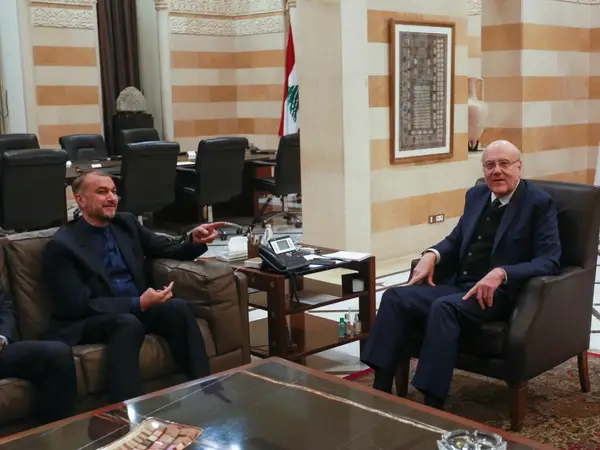Hossein Amir-Abdollahian, Iran’s foreign minister, has said the whole Middle East would benefit from a renewed nuclear deal between Tehran and world powers.
But during a meeting with Lebanese Prime Minister Najib Mikati Thursday evening, Amir-Abdollahian said “we’ve not reached the final point on lifting sanctions yet.”
Opponents of reviving the 2015 nuclear deal and lifting US sanctions say that giving Iran tens of billions of dollars will enable it to finance its allies and militant proxies in the region.
The foreign minister continuing his trip on Friday, met political leaders from all Lebanese sects, including President Michel Aoun, a Maronite Christian, and the heads of the two main Shia parties, house speaker Nabih Berri of Amal, and Hassan Nasrallah, general secretary of Hezbollah.
In a news conference after meeting with his counterpart Abdallah Bou Habib, Amir-Abdollahian said Iran wanted “a good, strong and lasting agreement, but not at the cost of crossing its red lines.” The foreign minister said United States sanctions should be removed “in the maximum way.”
A recurrent theme of Amir-Abdollahian’s visit has been the need for detente with Saudi Arabia in line with President Ebrahim Raisi’s commitment to improved relations with Iran’s neighbors.
The Lebanese foreign minister welcomed détente between Iran and Saudi Arabia, according to a readout of the meeting provided by Iran’s Foreign Ministry. Saudi-Iran tensions have often played out in Lebanon, which has a substantial population of both Sunni and Shia Muslims. Riyadh in October broke off diplomatic relations with Beirut, and its influence has also diminished with the withdrawal from politics of Saad Hariri, leader of the Sunni Mustaqbal party and a Saudi citizen, in January.
Keeping Doors Open
Bou Habib, according to a readout from the Lebanese foreign ministry, said not only Lebanon would benefit from an improvement in Tehran-Riyadh relations, which would also “provide an opportunity to help advance intra-Yemeni dialogue and resolve the crisis in that country.”
In an interview with Al Mayadeen television Friday, Amir-Abdollahian reiterated that Iran was ready for a fifth round of talks with Saudi Arabis and was “working hard to keep the doors of dialogue open between the two countries.” Earlier this month Iran suspended bilateral contacts, facilitated by Iraq, after Saudi Arabia beheaded 81 men − including 41 Shia Saudi Shia, seven Yemenis and a Syrian − for “heinous crimes.”
In a meeting with cultural and political scholars and figures Friday, the Iranian foreign minister said Tehran was “ready to help Lebanon with medical services, medicine and medical equipment and other basic needs.” Amir-Abdollahian said Thursday Iran had offered to establish two 1,000-megawatt power stations in Lebanon to help with its chronic power crisis and connect its energy grid to Lebanon through Syria and Iraq.
Much of Lebanon has zero mains electricity, following decades of corruption and a financial crisis that erupted in late 2020, plunging 80 percent of the population into poverty. The crash followed the failure of post-war governments to control a spiraling debt financed by expatriate deposits in the Lebanese banking sector.
But the Iranian foreign minister’s offer of assistance comes as Tehran has often complained about shortage of medicine and medical supplies because of US sanctions. It also suffers from chronic electricity shortages partly because the capacity of its power stations is inadequate.
Iranian government-controlled media reporting on Amir-Abdollahian's meetings did not mention his offer of assistance, possibly because of popular resentment toward Islamic Republic's long-standing policy of providing financial and military resources to allies and proxies in the region.
